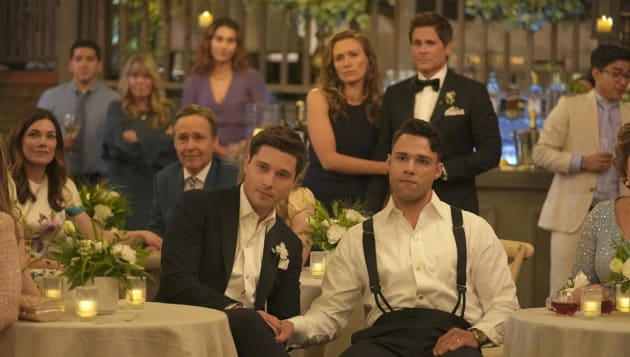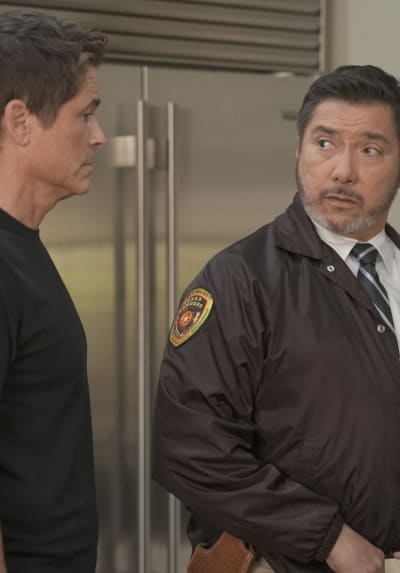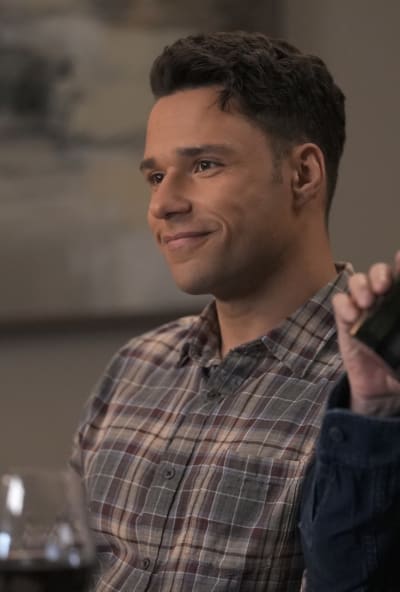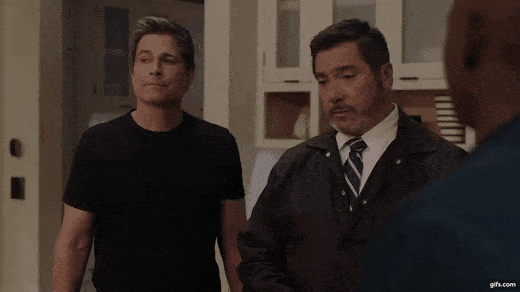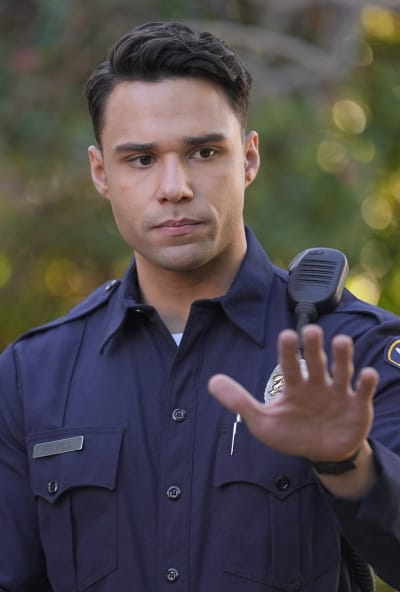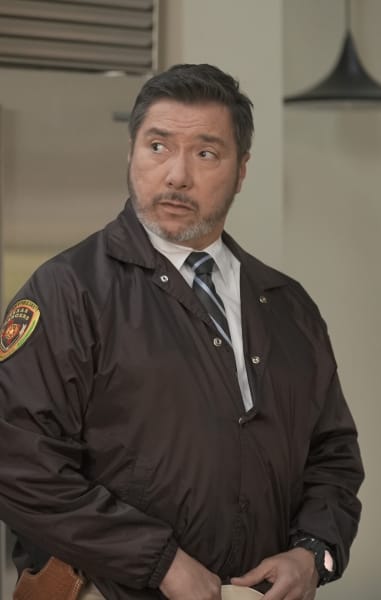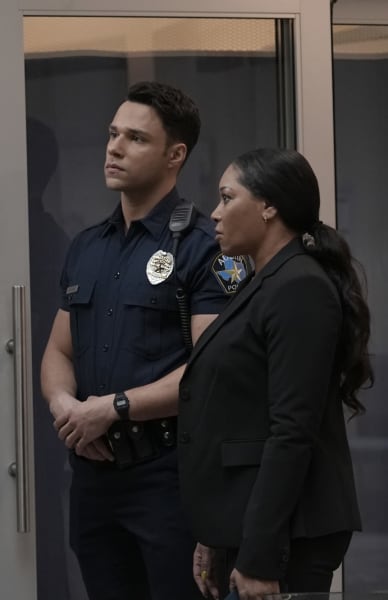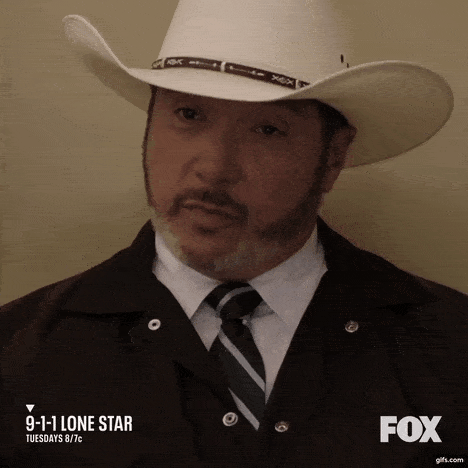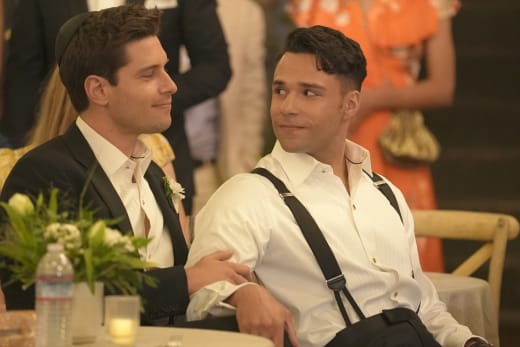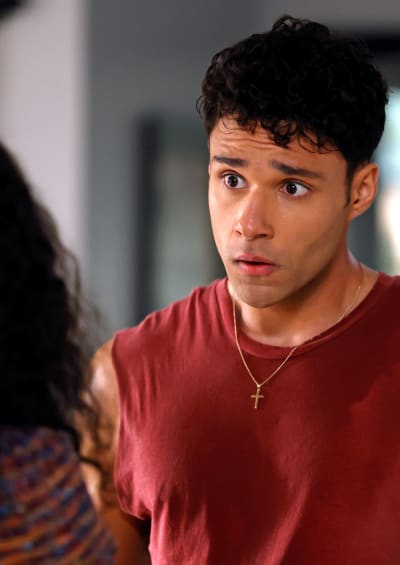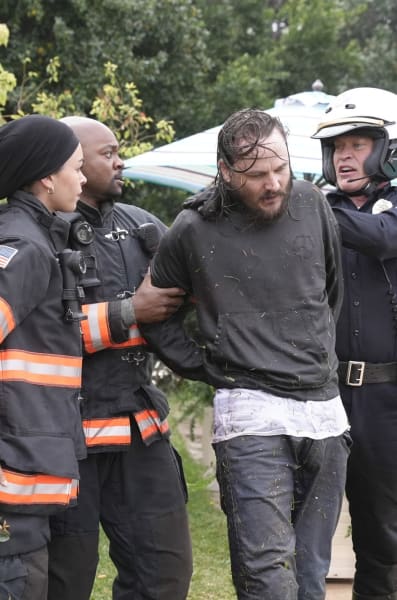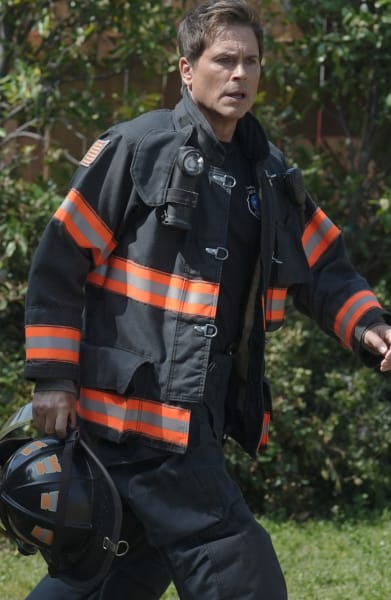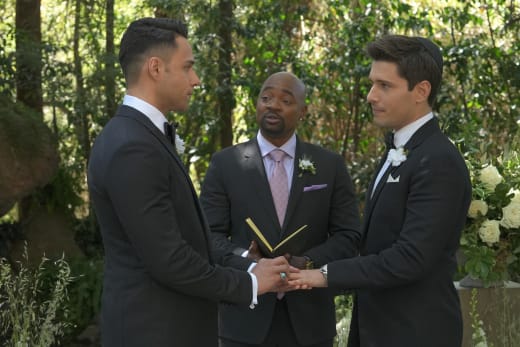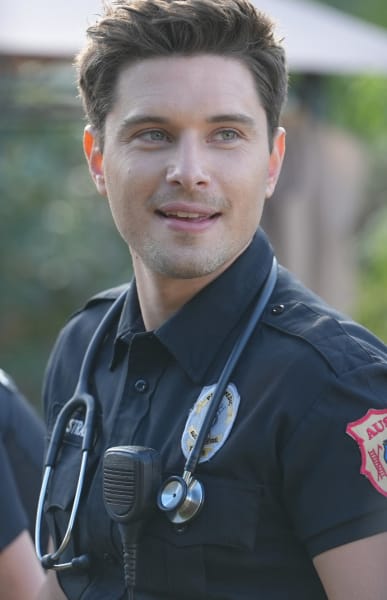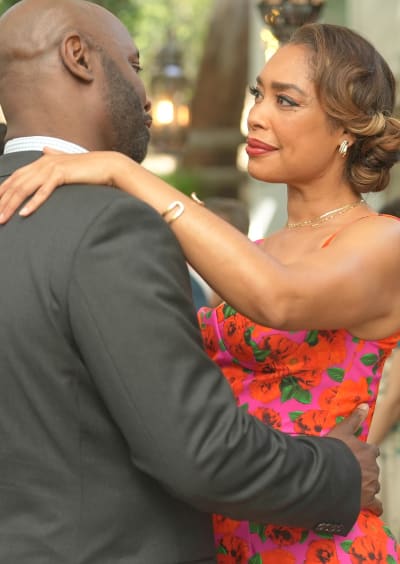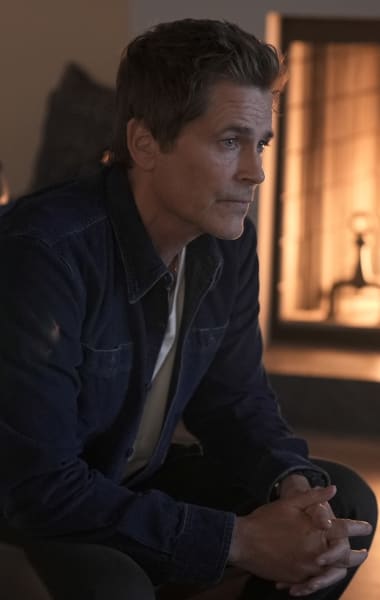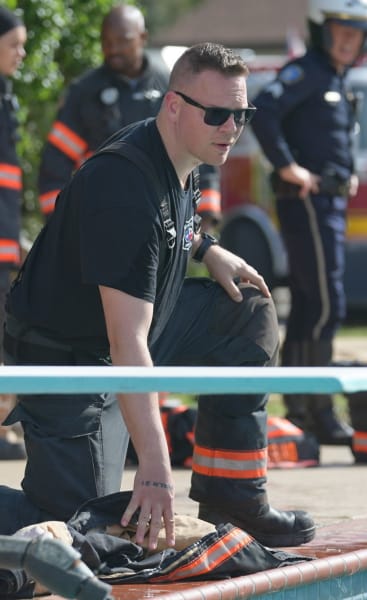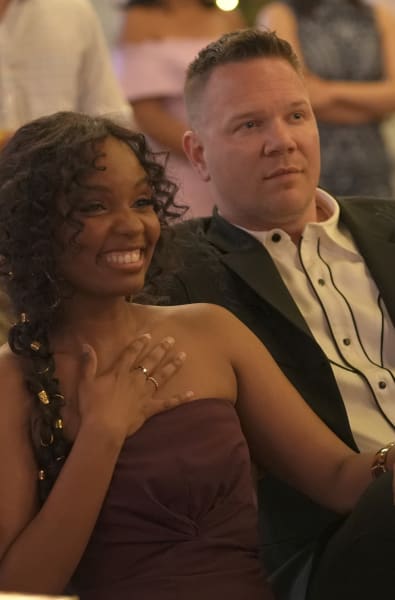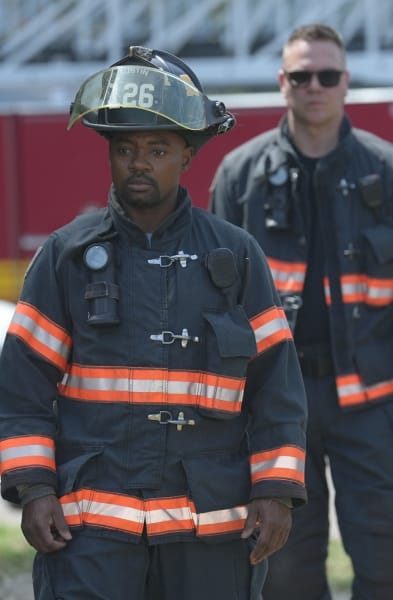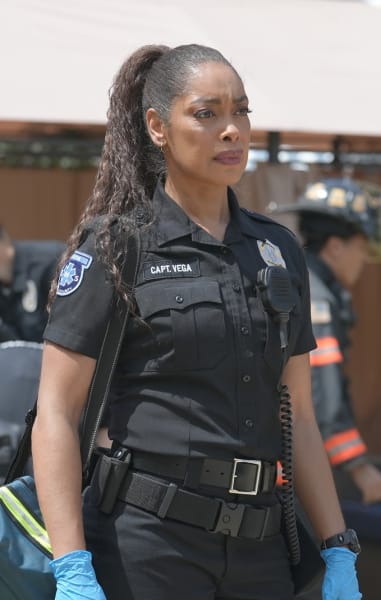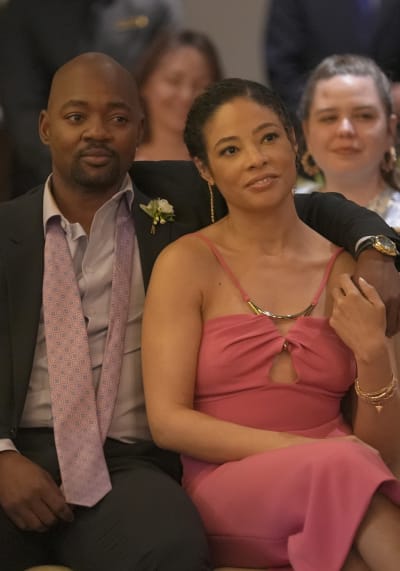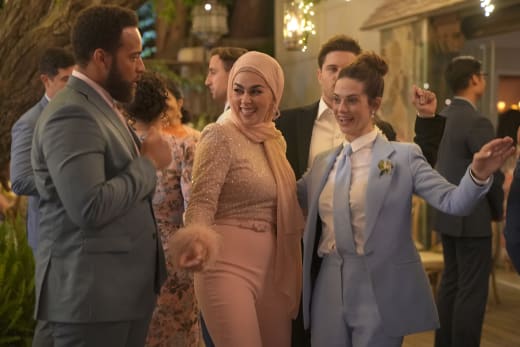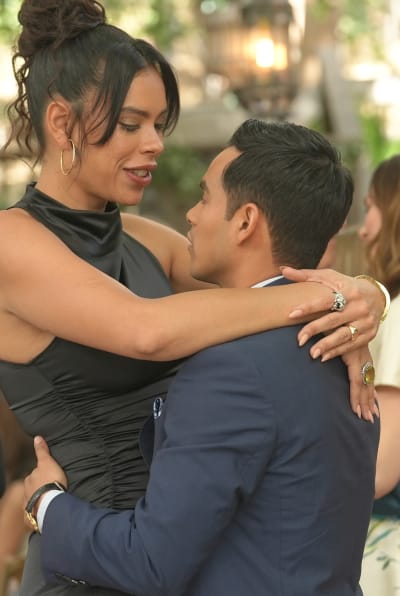It will take the entire hiatus to recover from the emotional rollercoaster that was this supersized finale.
There was so much bittersweetness to 9-1-1: Lone Star Season 4 Episode 17 and 9-1-1: Lone Star Season 4 Episode 18 as we hit impossible highs, experienced devastating lows, celebrated and mourned, and loved and lost.
At the center of it was Tarlos’ highly-anticipated wedding that’s been seasons in the making.
But first, we have to pour some tequila out for Gabriel Reyes. The speculation and fan theories were correct, and we did lose the Reyes patriarch by the close of the first hour.
He’s been this influential, wonderfully complex, rich character, and his loss will be felt from now on. To say I’m angry about it doesn’t do it justice. The series relies too heavily on shocking deaths to move the narrative forward.
It’ll never be said that Gabriel didn’t love his son, and it’s upsetting to know that he’ll no longer be around to truly celebrate the milestones in his son’s life or be the level-headed balance to Owen.
It’s upsetting to know that both T.K. and Carlos have undergone the tragic loss of a parent. It’s something else that bonds them, but goodness, did they have to be closer bonded in this way? Wasn’t Gwyn’s death tragic enough?
Through Gabriel’s presence in this series, 9-1-1: Lone Star showcased the complicated reality of the hard-wrought path some queer people must navigate when they come out to their families.
His storyline, in that regard, has always shown how genuinely good people can be flawed and hurtful, and the judgment he possessed could have this profound impact and influence on Carlos’ life.
The scars from their rough times never just go away, even when Gabriel had come around to accepting his son for who he really is. It’s one of the more realistic storylines this series has pulled off, an essential part of depicting one of the many diverse stories of the queer community.
And Benito Martinez and Rafael Silva have done some incredible work over the series by capturing the complexities of that dynamic with nuance in a way that feels authentic without necessarily pigeonholing either character.
Gabriel: Sounds like you’re calling me a Tío Tomás.
Carlos: No, I didn’t say that, Dad. I do understand the desire to be accepted by people who have historically rejected you. Gabriel: And can I ask you how long you’ve felt this way?
Carlos: The legacy of the Texas Ranger isn’t exactly a secret, Dad.
Gabriel: No, I mean how long you’ve been ashamed of me.
We’ve seen the best and worst of Gabriel Reyes, yet he’s remained a lovable character whose loss is gut-wrenching, and I appreciate the beauty in how they’ve displayed this compelling character.
His final installment wasn’t without some clunkiness. It’s evident that the series wanted to revisit some of Carlos and Gabriel’s history, pushing them toward truly setting it to rest once and for all, and it’s some solace that Carlos could get before his father’s tragic death.
In that sense, fiction provides Carlos with an opportunity that many people don’t get, some closure, that way of airing out grievances and not leaving any unsaid words. Because what we know and see is that Gabriel and Carlos were in a beautiful place before he died.
Carlos felt seen, heard, and unburdened by being honest with his father, and Gabriel let him know and showed him that he loved and was proud of him, and his giddiness over being Carlos’ best man was enough to bring a tender smile to one’s face.
Carlos: Gabriel is not here right now, is he?
Owen: But I am.
If Gabriel had to die and leave his son’s life, at least we know that he went out knowing that Carlos is proud of him, and Carlos knows the same, and even after his death got to see the depths of his father’s unconditional love and devotion to him.
In that sense, the series handles this beautifully and with a bittersweet hopefulness that real life doesn’t always afford people. It’s the light in the darkness of such a tragedy.
Nevertheless, the issue of Carlos getting on a soap box about the Rangers felt so contrived and ridiculous. It was hard to take Carlos seriously as he implied that his father was some Uncle Tom for joining an institution historically denigrating brown people.
Why? Because Carlos is a police officer. The entire institution of policing nationwide, including Texas, is rooted in and steeped in that history. Its origins flat out derive from slave-catching. Whether it’s state police, the F.B.I., U.S. Marshals, and so forth, all law enforcement has a dark history.
Carlos sitting on some type of high horse as a police officer was absurd on its own. He has no moral high ground with this, and it was downright laughable, considering we opened the season with an extensive case that involved a white supremacist group with ties to A.P.D.
Carlos’ inability to even consider that he and his father share similar plights and goals as brown men in law enforcement were puzzling. Maybe he was too blinded by his unresolved issues with his dad and the toxic masculinity that the Texas Rangers invokes even to consider that.
But it shouldn’t have taken this disagreement for Carlos even to consider what it would’ve been like for Gabriel joining the Texas Rangers as one of the only minorities when he did and everything he had to endure and build through the course of his career.
Truthfully, I could watch an entire side series or flashback episode unpacking Gabriel’s rise alone. In so many ways there is so much story left unexplored.
Carlos’ naïveté here feels a bit surreal, or the notion that some form of nepotism would’ve gotten him a hard-won spot or even consideration with this institution.
We know Gabriel had to scratch and claw his way to where he got. One can only imagine his efforts to diversify a historically racist institution, possessing the same thought process Carlos has — he’s serving his community by doing so.
You can’t dismantle something unless you’re on the inside of it. Gabriel has done that, rooting out corruption in the process.
Sadly, it’s taken this long for Carlos to really see his father for the man he is beyond the worst parts of his days as a father.
And we see many glimpses of this, from Carlos’ sisters (and it was nice to finally get to see them, though it sucks that it was under these circumstances) sharing all the stories of the sweet things Gabriel did that Carlos has blocked out because he’s let Gabriel’s worst parenting moments overshadow the overwhelmingly good ones.
We also saw it in that VHS tape of Gabriel being so tender and loving with a young Carlos, slaying his monsters, reminding him that he’ll always fight for his son.
Carlos and Gabriel’s story has always been one of generational trauma and cycles, and this is deeply rooted but just barely explored cultural machismo. I almost mourn the potential end of that story, and all it could be as much as the character himself because it’s important storytelling.
Because it’s not a matter of rewriting history or retconning, in the way that the situation with Iris most certainly was. On that note, seeing what we have with the wedding, was that storyline necessary or worth it? It’s a resounding no.
The Gabriel bits feel like filling in and adding more context and layers that we weren’t privy to before because it’s not uncommon only to see things from Carlos’ perspective.
Judd: They say it’s a 99% chance that he could never walk again.
Tommy: Hey, 99 ain’t 100.
It’s very realistic that he’s allowed the worst parts of his father or the thing that hurt him the most to ultimately affect how he’s viewed this man as a whole. That is an authentic thing to do, and I appreciated the tidbits along the way, how he didn’t know his father drank Green tea or loved puzzles or things of that nature.
This could potentially set up a fascinating arc for Carlos in the next season as he recognizes that despite his insecurities, he’s very much like his father, and the idea of following in his footsteps is a desire of his and not something he felt was forced upon him.
I can hope that they’re revisiting the storyline of who killed Gabriel. We don’t always get closure or answers, but this is Lone Star, and it’s about time for Carlos, the actual law enforcement officer, to immerse himself in a long-term arc of danger, excitement, and crime fighting. Now he has a personal drive for it.
Carlos fell down a rabbit hole, and it was tough to witness, and he nearly threw everything away with his confrontation with Pablo. He probably would’ve pulled that trigger if Owen hadn’t shown up.
Owen: But the brutal reality is that you may not ever know who did this and if you don’t make peace with that, then your father’s life isn’t the only one that gunman took. To Gabriel.
Carlos: Te quiero siempre, Papá.
Owen: He knows.
Carlos always seems to keep his feelings close to his vest and try to keep a handle on his emotions and have control over everything. As unfortunate as the situation was, seeing him in this capacity was refreshing. We’re unlocking new levels of this character now that we have time to explore him.
And Rafael Silva puts forward some fantastic work. If Parrack shined in the first hour, the second belonged to Silva.
He delivers an INCREDIBLE performance, from Carlos’ restrained feelings to his silent grief, the tears at that funeral, to the unhinged, erratic, vengeful reactions of a grieving son.
We saw so much range from Carlos and Silva himself, showcasing yet again why he’s one of this series’s dark horse, underrated performers.
I do not believe that this whole thing with Gabriel investigating corruption across all the law enforcement agencies ends here. It didn’t feel like a tight little bow to place on things or this matter of Gabriel’s work being over.
I would not be surprised if Gabriel’s boss was entrenched or had some connection to the cartel. You don’t tease a storyline like this to drop it; it far expands beyond the cartel.
It’s exciting to explore in the future, and it opens up the concept of Carlos joining the Texas Rangers, not only honoring his father’s memory and legacy but continuing his work and finding his father’s killer.
One of the drawbacks of this new development is that it felt right for Carlos to be wary of others. His not trusting just anyone felt like the right call, and as much as he needed someone to stop him, I hate that Owen confided in O’Brien, who then reached out to the head of the Texas Rangers.
We don’t know if he’s involved, how deep Gabriel’s work goes, or if it’s even over because that’s highly unlikely. I hope that’s something we can explore next season.
Owen’s ability to interfere and talk Carlos down was done well. I won’t even get into the visual of Owen stepping in to talk him down when O’Brien’s solution was to pull his gun out on Carlos instead of extending him the grace you typically do a fellow officer.
Even subconsciously, the imagery of that speaks to everything that Gabriel and Carlos have fought for and why they felt they needed to be in the field.
All of this also sets Owen up to be the paternal figure that Carlos has left, and he seems to take that responsibility seriously and takes to it instantly. I look forward to their interactions moving forward, which carry a different weight than what they had before.
Owen had just the perfect amount of presence and was utilized well in this finale.
Despite all this heaviness, we still got the Tarlos wedding. And it’s no secret that this series doesn’t shy away from all types of drama and emotions.
I can appreciate the significance of this hard-fought moment for this pairing. It’s been four years in the making that Carlos and T.K. got to walk down the aisle together in a beautiful ceremony that felt both traditional and modern in all the right ways.
The significance of this queer couple, of these two men from different paths of life and identities, getting married in front of all their loved ones by a trans man is powerful today when queer love is still a fight and constantly under attack.
It’s also why it’s disappointing that even in fiction, we can’t have it depicted without being marred by tragedy, sadness, and violence. We reached a point where Gabriel would be at his son’s wedding to celebrate him without issue because he fully accepted his queer son, and then he wasn’t there anyway because he got murdered.
Carlos, when I first met you, you looked at me as if you knew something about me that I didn’t know myself. You saw me for the man I had become and you lit the path for me to get there. I spent so long feeling like I didn’t deserve happiness or even a future, like maybe I was too broken, but you changed that, and whenever I see you, and whenever I’m with you, I am whole, and I vow to take care and nurture your heart for the rest of my life as if it was my own.
T.K
It was hard to enjoy this massive celebration with such a tragic loss and darkness that shadowed it, even though most of the wedding was so surprisingly happy that the tone almost felt like they forget that Gabriel had just died that week!
Carlos and T.K.’s vows were perfect, and the touch of them mirroring each other a bit was beautiful. It was even fitting that Carlos memorized his, and they had all these sweet touches that embodied this series and the world they’ve built with these characters.
I loved that they had a flower boy and that Carlos and T.K. walked down the aisle together. They’ve seen each other through difficult times, which felt good and genuinely lovely.
Tommy performing at the wedding was unexpected and beautiful, and Gina Torres looked and sounded gorgeous. The little touches that nodded at Gwyn, including her cameo as Owen imagined her there, were sweet.
As polarizing as Owen can be as a character, it’s true that in saving his son’s life and bringing him there, T.K. got this second chance at life, and he found love, happiness, and everything that he desired, and now Carlos can take things from there, and has.
For Tommy, we could be gearing up for another wedding in the future. She’s expressed that she’s open to marriage with Trevor, and that’s such a touching thing for those two.
And for Owen, he got to see his brother have the perfect moment he talked about leading up to his death.
Thankfully, Robert didn’t want Owen to do the deed of killing him. He only wanted Owen to be the one to find him and get rid of the evidence.
Tyler Kennedy Strand, you are the dream I would not allow myself to have. I have lived my life in so much fear, closed off, shut down in ways I didn’t realize, but you are the key that unlocked me. The fact that I am standing here with you today, before God, my family, and everyone, is nothing short of a miracle. You’re a miracle, TK Strand, my miracle and the greatest adventure of my life. And no matter where the journey takes us, I vow to be there be by your side, I vow to be the caretaker of your wild heart.
Carlos
Every moment of Owen having to process that his brother was dying and there was nothing else he could do was heartbreaking. It was one of Lowe’s finest installments of the series to date. With Owen’s more muted role, we got the family man and supporting character more than the, at times, frustrating guy with a hero complex.
The Lowe men did such beautiful work with their scenes, and it was hard not to get emotional during them. Owen didn’t have long with his brother, but their time together was no less meaningful.
When he had to make that final call to close out the season, one’s heart just broke for him. Seriously, haven’t these Strand men been through enough?
Owen endured a few life changes in this finale without totally dominating it, which was refreshing.
He also has to deal with Judd leaving. Owen calling Judd his best friend was such a touching moment.
But the idea of Judd quitting is frustrating.
I understand the idea of him wanting to take care of his son, and he feels that he owes him so much for all the time he was unable to do so, but this is such a drastic decision to make for one family member without consideration for the others.
Wyatt is a sweet kid, but they have this habit of showing all the ways where his sudden presence in their life has disrupted and deeply affected the family Judd has with Grace and Charlie, but then they don’t really address that and move on to focus on Wyatt.
Grace: You gonna quit your job?
Judd: Babe, for 17 years, I wasn’t there for that boy, and I have the chance to make that right, and I ain’t going to miss it. Grace: OK.
Judd is a firefighter, and he’s second in command. He’s been at the 126 firefighting for two decades.
For him to up and quit, cash out on his benefits to pay for everything he needed to do to accommodate Wyatt, and basically leave Grace as the primary breadwinner without really discussing it with her much is outrageous.
Wyatt was in pretty good spirits despite his injuries and had more faith than his parents did initially. But that quickly changed when Judd and Marlene told him he might not walk again.
It’s dashed his hopes of becoming a firefighter, which was a storyline that, frankly, we had to get used to on its own since it didn’t feel like it fit the bill for the character in the first place.
And now, Wyatt is an expectant dad paralyzed from the waist down and living with the Ryders. It’s a bit too much drama for my taste. And the series relies too heavily on drama, always centering on Wyatt.
Judd isn’t prepared to take care of Wyatt like this. It’s a lot, and it’ll be incredibly challenging for everyone, and Wyatt isn’t crazy about the situation either.
But it remains frustrating that Judd always feels compelled to make up for being an absentee dad when we know he didn’t have a choice in the matter.
As sucky as the situation is all around, it would’ve probably just made more logical sense, though it came at the expense of our love of Judd if he had bailed on Marlene after finding out she was pregnant.
It’s like they set him on this paternal redemption arc when nothing supports why he needs to redeem himself for something he didn’t know about in the first place.
Now Judd has quit his job, used up his money, and moved Wyatt into the Ryder living room to take care of him to make up for the past, and Grace and Charlie have to be supportive of it and go along.
It’s not fair. And we still need to get to the baby on the way and how that will factor into things.
Family is all messy and complicated, but good grief.
Judd: I just want to help you, son.
Wyatt: I know, and I appreciate that, dad. I just don’t think that this is the best thing for our relationship.
But as Tommy reminded Judd, in another sweet moment between the besties, 99% isn’t 100, and maybe Wyatt will have a miracle on his hands in no time.
While his feelings about Judd being too hard on him in his healing process are valid, Judd may be what he needs regardless.
The other characters fell into the background during most of the finale. And the one big save was that incident with the man who stole the woman’s car.
You would think he’d abandon it once he saw a crying baby inside. And what sense did it make for him not to realize the firefighters were in on the high-speed chase and that they wouldn’t just move out of the way so he could keep going?
I also hate that they went on this chase hoping to do what was best for the baby, and she still ended up in a freaking pool. It felt reckless; what if people were in the pool when the car went through?
The parallels of Owen saving a baby when Tarlos first met lined up with their wedding approaching was nice enough, but that was a rough call all around.
And with this finale, it was a reminder that while many of the characters took turns with a personal arc in a centric installment, overall, they didn’t have much going on all season.
It was easy for everyone to stay on the sidelines for the finale since most of them had nothing long-reaching that needed to get wrapped up.
Everybody, this is Judd Ryder. He’s… my best friend.
Owen
Paul and Marjan are happily together with Asha and Yusuf. Nancy and Mateo seem fine with each other, particularly since they had the least going on all season, especially Nancy, who still hasn’t had a storyline.
They were just there to celebrate the wedding. It was a good time.
Perhaps the development with Judd can introduce the idea of who would become a lieutenant and serve as second in command in his stead among Marjan, Paul, and Mateo.
It’s about the only avenue based on what the finale produced that could tease what the future has in store for these other characters.
Over to you, Lone Star Fanatics. Are you devastated over Gabriel’s death? Was the Tarlos wedding everything you imagined? How badly do you feel about Owen losing another person? Sound off below.
To relive this emotional season, you can watch 9-1-1: Lone Star online here via TV Fanatic.
Jasmine Blu is a senior staff writer for TV Fanatic. She is an insomniac who spends late nights and early mornings binge-watching way too many shows and binge-drinking way too much tea. Her eclectic taste makes her an unpredictable viewer with an appreciation for complex characters, diverse representation, dynamic duos, compelling stories, and guilty pleasures. You’ll definitely find her obsessively live-tweeting, waxing poetic, and chatting up fellow Fanatics and readers. Follow her on Twitter.
